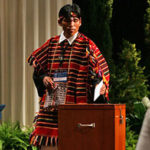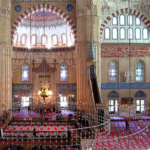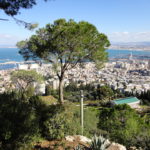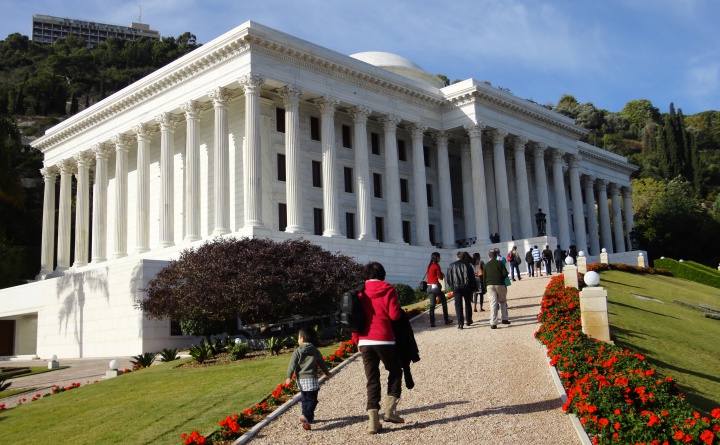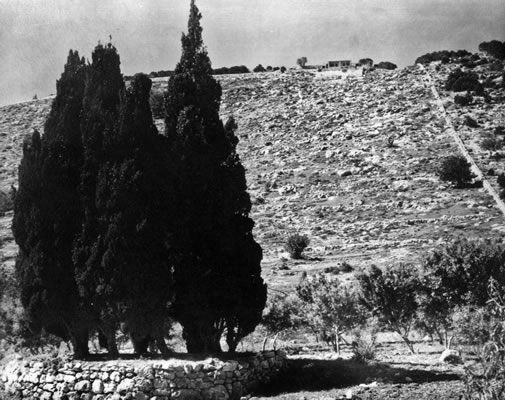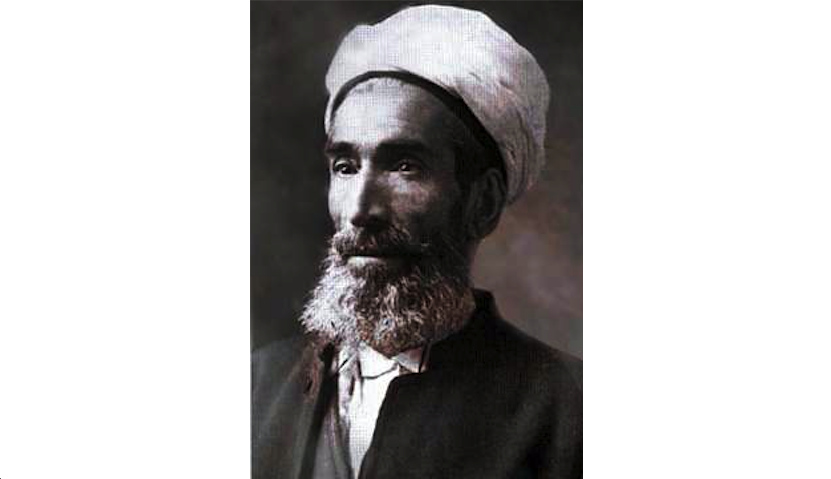
Mirza Abu’l Fadl – the Man Who Would Not Believe
 Mirza Abu’l Fadl of Gulpaygan is remembered as one of the greatest scholars of the Baha’i Faith and he lived in the time of Bahá’u’lláh and Abdu’l Baha. Abdu’l Baha would mention his works – for example his treatise, The Brilliant Proof, responding to Christian preacher in London and he recommended reading Mirza Abu’l Fadl’s writings as a way of learning about the Baha’i Faith.[1][2] Mirza Abu’l Fadl wrote many works about the Baha’i teachings. He is buried next to another great Baha’i, Lua Getsinger. One of the exterior doors of the Shrine of the Bab is named after him.
Mirza Abu’l Fadl of Gulpaygan is remembered as one of the greatest scholars of the Baha’i Faith and he lived in the time of Bahá’u’lláh and Abdu’l Baha. Abdu’l Baha would mention his works – for example his treatise, The Brilliant Proof, responding to Christian preacher in London and he recommended reading Mirza Abu’l Fadl’s writings as a way of learning about the Baha’i Faith.[1][2] Mirza Abu’l Fadl wrote many works about the Baha’i teachings. He is buried next to another great Baha’i, Lua Getsinger. One of the exterior doors of the Shrine of the Bab is named after him.
The stories of how people become Baha’is are often beautiful and the question “how did you become a Baha’i?” is often the prelude to a wonderful story. Some become Baha’is almost instantly on hearing about the Baha’i Faith, others may take months or years. Sometimes the story reveals realities about human nature. Such is the case of Mirza Abu’l Fadl’s journey. Often we must overcome the forces of ego to start on this journey. It is a struggle which continues for the rest of life.
Mirza Abu’l Fadl was, as has been observed in a previous article, a very accomplished religious scholar before becoming a Baha’i.
Adib Taherzadeh tells the story beautifully, the account below closely follows his telling.
As was the way of the world in which Mirza Abu’l Fadl lived, a person’s rank and standing was marked out by the clothes they wore. As a noted religious scholar, he accordingly wore the massive turban and robes of someone of his rank. One day, while in the company of some mullahs, Mirza Abu’l Fadl’s donkey lost a shoe and Mirza Abu’l Fadl was therefore in a blacksmith’s shop having a new shoe fitted. It happened that this blacksmith was a Baha’i and he decided to test the scholar. This part of the story is well known but it goes like this.
Treating the great man with the deference due to his rank the illiterate blacksmith sought permission to ask Mirza Abu’l Fadl a question that, he said, had been troubling him. The scholar consented and the blacksmith asked. “Is it true that the religious traditions state that each raindrop is accompanied by an angel?” “Yes” replied the scholar. The blacksmith then asked permission to put another question. Again the scholar agreed. The blacksmith then asked, “Is it also true that it is said in the traditions that if there is a dog in the house an angel will never visit that home?“. Without thinking the scholar replied again “Yes“. The blacksmith then observed. “In that case, no rain should ever fall on a house in which there is a dog.”
Mirza Abu’l Fadl was outraged at being humiliated by an illiterate blacksmith and his companions whispered to him that the blacksmith was a Baha’i.
The blacksmith, however, had a keen insight into human character, and he was not motivated by unkindness, but rather by a desire to open the eyes of someone whose great learning was a barrier to new ideas. He suggested to his friends that as the scholar’s pride had been hurt he would want to argue with Baha’is to restore it. The blacksmith was right and Mirza Abu’l Fadl accepted an invitation to debate a Baha’i from someone who knew him. This man also was wise, and he did not introduce the scholar to people of great learning. Rather he would introduce him to “simple” Baha’is “devoid of learning”. These apparently unlearned folk were able to easily confound him and demonstrate their true insight. After a while, Mirza Abu’l Fadl became more and more humble and later he also met learned Baha’is. In his own words Mirza Abu’l Fadl writes:
For nearly eight months [I] held many a debate with the learned of this Faith. At the end of this period I found that all my vain imaginings had been broken down and had vanished. I then began to tread the path of search after truth.
Although Mirza Abu’l Fadl became more and more attracted to what he learnt, he was still unable to face the choice before him. Like George Townshend, becoming a Baha’i would mean the loss of position and everything he had devoted his life to.
One day Mirza Abu’l Fadl came across Bahá’u’lláh’s writings that predicted the downfall of the Chief Vizier and Sultan of the Ottoman Empire. We have already encountered the Suriy-i-Rais. A similar letter of Bahá’u’lláh was the Lawh-i-Fuad, which also predicts the downfall of the Sultan. The work contains the story of the puppet show, that Bahá’u’lláh tells. Here is how Mirza Abu’l Fadl tells the story:
… I came upon the story of the ‘Show of Sultan Salim’ and I was fascinated by it. I found the passages to be of utmost eloquence, lucidity and sweetness. The more I read it, the more I wanted to read. … Then I came across these exalted words: “Soon will We dismiss the one who was like unto him, and will lay hand on their Chief who ruleth the land, and I, verily, am the Almighty, the All-Compelling”.
… I became speechless. … I wondered whether it was great magic or sorcery, and certainly it provided a great test for me. … Vain imaginings … were flooding my mind and yet I praise God and thank Him for his loving grace that I was never inclined to dislike Bahá’u’lláh.
… I declared that for me the fulfilment of these prophecies would constitute the proof and criterion for truth. I also got a pledge that no one would talk to me about the faith any more until these prophecies were fulfilled.
I thought to myself that the incident … was an act of providence which relieved me of further discussion with the Baha’is, but also provided a way by which I would be able to guide these souls and rescue them from going the wrong way. ….
Five or six months passed by … During that period I often thought of Baha’u’llah’s prophecy concerning the Sultan. … one day I was passing by the Shah Mosque of Tihran. [ and I saw two Baha’is]
These two men were standing in the street and talking together. As I was trying to shun the Baha’is and steer clear of them, I pulled my [cloak] over my head and began to cross the road away from these two men. But they saw me and called me by name, and I had no choice but to respond to their call. They said, … ‘The news of the dethronement of Sultan Abdu’l Aziz has reached here by telegram.’ This news dealt me an enormously heavy blow. … I flared up with rage and shouted at them angrily, ‘It is no concern of mine that the Sultan has been deposed. I am not a relative of his’. ‘Did you not make your acceptance of the truth of this Faith’, they reminded me, ‘dependent upon this event?’ I was so convulsed with rage that I walked away without saying farewell. …
Knowing the immensity of this test, I was overcome with emotion and with tears flowing uncontrollably from my eyes I begged God to assist me so that I might not be misled. …
[A few days later] I apologized for my behaviour … and said to them that we must now wait until the prophecy of ‘We will lay hand on their Chief’ be fulfilled.
… A few days passed and the news of the assassination of the Sultan was flashed by telegram. I went out of my mind, and was utterly perplexed. …
One night … I began to admonish myself in these words. ‘It is about one year that you have been associating and arguing with these Baha’is. These men are illiterate and uneducated, yet they have … ascendancy over you every time, they have … demonstrated the validity of their Cause. … It is as if they are inspired and assisted by God, and the Holy Spirit speaks through them. You have also been a witness to their exalted character and heavenly virtues. Why then should you interpret their words as the breathings of the evil whisperer? …
I arose, performed my ablutions and said prayers. I then took the [Lawh-i-Rais], which, although it had been in my possession for a long time, I had not been moved to read. I opened it, turned tearfully and with devotion to God, and began to read it. It was then that I heard the voice of God … calling me through the mouthpiece of this Manifestation, ‘Am I not your Lord?’ To that call reaching me … I responded with all my heart, ‘Thou art, thou art.’ I believed.
Primary Source: Adib Taherzadeh, The Revelation of Bahá’u’lláh, Volume 3, pages 93 and following.
Image: Mirza Abu’l Fadl – http://library.bahai.org/sc/abu.jpg, Public Domain, https://commons.wikimedia.org/w/index.php?curid=4028893
(This article is the 139th in a series of what I hope will be 200 articles in 200 days for the 200th anniversary of the birth of Bahá’u’lláh. The anniversary is being celebrated around the world on 21 and 22 October 2017, The articles are simply my personal reflections on Bahá’u’lláh’s life and work. Any errors or inadequacies in these articles are solely my responsibility.)

